How to clean a washing machine with citric acid: advantages and disadvantages of the method
Today it is difficult to imagine a family that does not have a washing machine. It has long ceased to be a luxury item, and in families where there are small children, this assistant just can not do. Do you agree? But, like any household appliances, the washing machine can break.
The most common cause of damage is scale on its parts. She is able to reduce consumer characteristics and even disable your assistant.
To prevent problems, it doesn’t hurt to know how to clean the washing machine with citric acid (LK). This method is absolutely safe for technology, but only subject to certain rules.
In this material you will find expert advice that will help to properly clean the washing machine from scale without resorting to the services of specialists. We will talk about how often you need to carry out preventive cleaning with citric acid. In addition, the article contains videos that clearly demonstrate the process of caring for the equipment.
The content of the article:
Scale and chemistry for its removal
The basis of scale in household washing machines (SM) is insoluble carbonates of magnesium and calcium (CaCO3 and MgCO3)settling on the details. They determine the water hardness level, and their concentration affects not only the scale formation process, but also the chemical effectiveness of the detergent.
In accessible places, salt deposits can be torn off mechanically, but getting to scale on a heating heater is quite problematic.
Therefore, to remove it in hard-to-reach places, a chemical method using citric acid is used. She dissolves CaCO3 and MgCO3, and does not corrode metal surfaces.
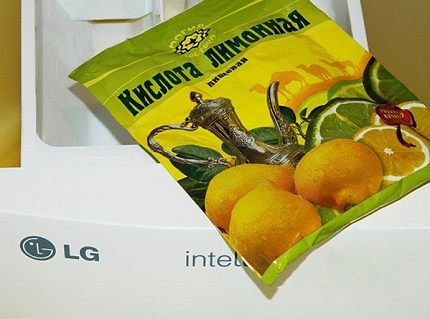
The chemical reaction is as follows:
2C6N8ABOUT7 + 3СаСО3 = Ca3(WITH6N5ABOUT7)2 + 3CO2 + 3H2ABOUT.
During the reaction, calcium citrate is formed in the SM (Ca3(WITH6H5O7)2), which dissolves well in water and is removed with it when draining. It is safe for humans and is even available in tablets to replenish calcium reserves in the body.
Theoretically, to clean a washing machine from 100 grams of scale, 125 grams of citric acid would be required. This chemical fact must be remembered when evaluating the effectiveness of the cleaning performed.
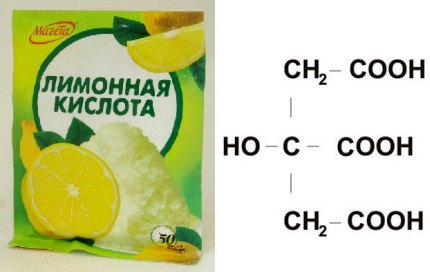
Causes and consequences of scale formation
The scale formed in the washer is a fait accompli that requires a response. But one cannot ignore the reasons for its appearance, which can repeat the process of salt deposition on the details.
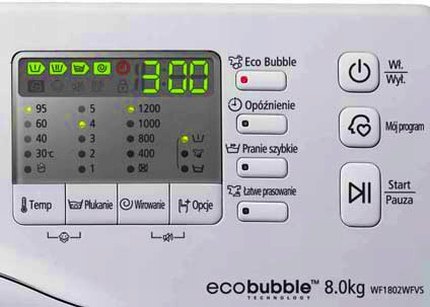
Scale formation is promoted by:
- carbonates, cations of calcium, magnesium dissolved in water;
- high washing temperature (over 60 ° C);
- the use of phosphate-free powders.
The effect of high temperatures lies in the fact that with strong heating on the metal surface of the heating elements steam bubbles begin to form - the result of local boiling of water.
At the micro level, this leads to its separation into a pure fraction H2Opassing into the surrounding liquid, and insoluble carbonates deposited on the metal. The higher the washing temperature, the more limescale is bound in one cycle.
Besfosfatny powders favorably affect ecosystems of reservoirs into which the sewerage merges, but they bring only problems to people.
Phosphates reduce the overall hardness of water and inhibit the formation of insoluble carbonates, so they are used in special products for the internal cleaning of washing machines.
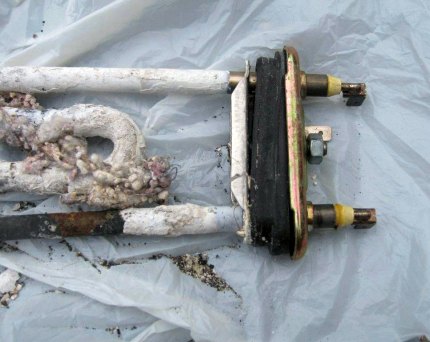
The absence of phosphates in washing powders leads to an acceleration of salt deposition on the SM parts.
The formation of scale is fraught with the following consequences:
- Overheating of the heater due to poor heat transfer to the surrounding water through scale.
- A layer of salts isolates metal and rubber parts from air, which helps retain moisture in them, moldrust and reduce strength.
In general, scum is not good enough, so you should remove it with citric acid or specialized scum for washing. The features of this method should know the maximum information.
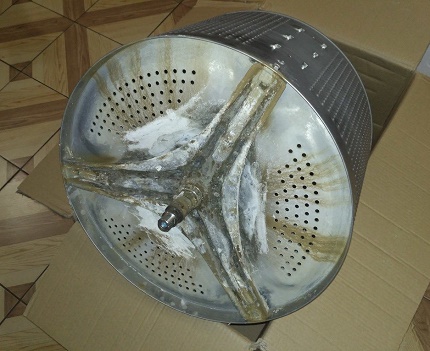
Pros and Cons of Citric Acid Cleansing
The properties of citric acid are due to its chemical structure. This substance was not specifically invented for cleaning washing machines, therefore its effect on the details of the technique has both positive and negative sides.
The positive aspects of the method
Without scaling in the SM, one can expect, at a minimum, burnout and the need replacement of TEN. Therefore, pulling with a cleaning procedure is not worth it. The method of removing deposits should allow everyone without experience to carry out the procedure.
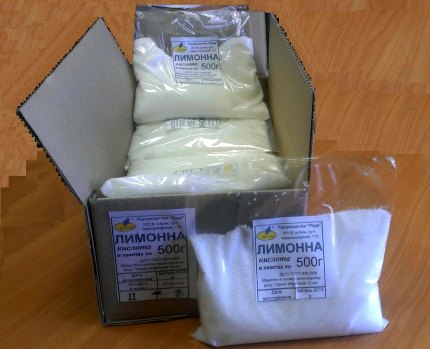
The use of citric acid to eliminate accumulated insoluble salts meets this requirement due to several advantages:
- Availability and low cost. The right amount of citric acid can be bought at any store for several tens of rubles.
- Simplicity. Even an unprepared person can carry out the cleaning procedure.
- Efficiency. 100 g of citric acid will dissolve up to 80 g of scale.
- Safety. Both citric acid and calcium citrate formed after dissolving scale are harmless to health.
These positive aspects of LC make it the drug of choice in the fight against scale. It makes no sense to buy expensive special means for cleaning SM, if they provide a similar effect.
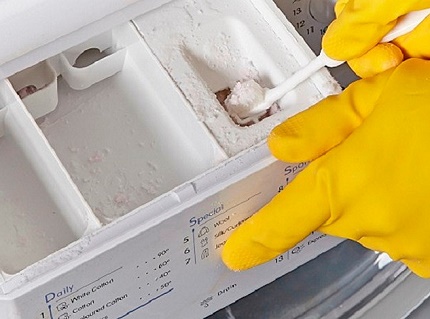
Confirmation of the effectiveness of removal of the accumulation of citric acid is demonstrated in the video:
The negative effects of citric acid
There are legends about the negative effect of citric acid on internal parts when cleaning the washing machine. Numerous arguments are presented against this method, but few provide evidence.
The theoretical claims of people to clean SM with citric acid are:
- The formation of salts that remain in the washing machine and can clog the drain.
- Acid corrodes the metal components of the heater.
- Rubber seals soften and may crack.
- After cleaning things have a specific smell.
A 1% citric acid solution is used to remove scale in the SM.
For comparison, a 10% solution of aggressive hydrochloric acid is used to clean water boilers from deposits. And even multiple processing with such a powerful tool does not affect the operation of the equipment. And rubber is generally resistant to short-term exposure to weak acids.
A problem will arise if crystals or a solution of citric acid remain in the pocket of the rubber cuff that seals the door. In other cases, the negative effect of citric acid on the inside of the washing machine is a myth.
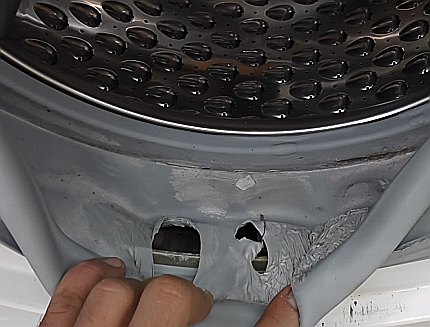
The salts formed during the cleaning of the scale along with the residues of LA are completely removed by the next two or three rinses, leaving no smell or sediment.
Are all the cons of citric acid turned out to be far-fetched? No, descaling has another drawback, but it is common to all cleaning products.
Insoluble salts can accumulate in places where water leaks, temporarily tightening the hole and removing the problem. After cleaning the washing machine, the leak may appear again. The described problem is not initiated by citric acid or other means, but the possibility of its occurrence should be remembered.
The consequences of using LK for cleaning SM are presented video:
Instructions for cleaning the machine "lemon"
Citric acid cleans not only the internal parts of the CM, but also the box for falling asleep powder, the door and its rubber gasket.
To do this, you will need:
- 100 g of citric acid;
- water absorbent rag.
The following step-by-step instructions for cleaning the washing machine with citric acid are guaranteed to help get rid of internal deposits of salts, without harming the details of the equipment.
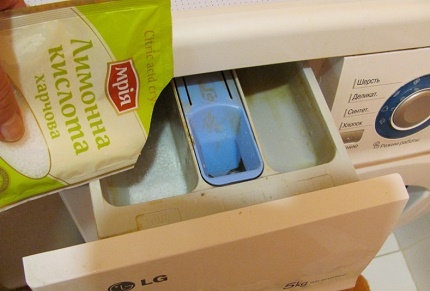
Step # 1: preparing for cleaning
You should first check the drum again and remove things from it, if any. Then measure out 100 g of citric acid for a washing machine with a load of 6 kg. If the technique involves a different maximum amount of laundry, then the amount of reagent should be adjusted in the appropriate direction.
You can use a lemon in 2 types:
- crystalline;
- diluted in water.
Dissolved acid is preferred because crystals are guaranteed to not get stuck anywhere. 100 grams of lemons are bred in half a liter of warm water. LK in dissolved form is not suitable for cleaning washing machines, which at the beginning of work pump out the remaining water under the drum.
Step # 2: loading acid and turning on the washing machine
Crystalline powder is loaded into the receiver for washing powder, and the dissolved lemon can immediately be poured onto the drum before closing the door.
The maximum long-term washing mode with a water temperature of 90-95 ° C is selected and turned on. It should have a minimum of 3 rinses.
Step # 3: removing crystalline acid residues
After the final set of water in the machine, open the compartment for loading the powder and rub the remaining lemon along its walls. If she is not there, then you can borrow a little reagent in the kitchen.
After 30-60 minutes, it is necessary to wipe the compartment with a damp cloth, removing the plaque there. The main thing is to have time to remove the acid before starting the rinse regimen.
Step # 4: inspecting the washing machine
After washing, open the door and allow the interior to dry. Separately, you need to wipe the accumulated water in the pocket of the rubber cuff.
Additionally, you can remove the bottom panel of the machine and clean the drain filterin which breakaway particles of limescale may be stuck.
The door SM and rubber seal must be wiped with a cloth soaked in 1% citric acid solution. The remaining plaque on them should be easily removed. This completes the descaling process. It is important to wipe the rubber seal well so that you don’t have to replace sealing cuff.
Product Care Tips
Professionals recommend using special equipment regularly to prevent the appearance of scale. This advice can be ignored if every 4-6 months washing machine cleaning “Lemon”.
The frequency of the procedure depends on the hardness of the water in the region and the average temperature of the wash. The higher they are, the more often you need to clean the equipment.
Inside the machine, citric acid is in contact only with the heater and the working space of metal, plastic and rubber. She and her couples do not get on the engine, the electronic board and other critical elements of technology, so you should not be afraid of the regular use of LC.
Although the process of cleaning SM with citric acid is quite simple, it’s better to prevent the formation of scale than to remove it later.
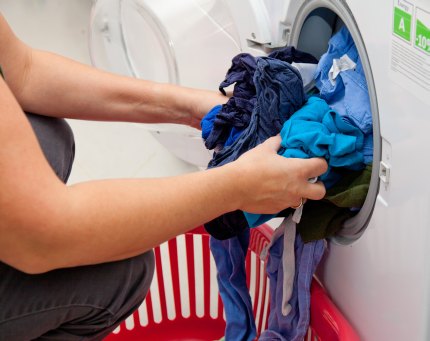
The suggested tips will help reduce the deposits of insoluble salts on the internal parts of the machine and reduce the likelihood of its breakdown:
- After washing, keep the drum open until it dries completely.
- Buy powders containing water softening components.
- Pour detergent in the volume recommended for hard water.
- Do not machine shabby, decaying clothes.
- When washing, it is preferable to use modes with a maximum temperature of 40-50 ° C.
- Pull linen from the SM immediately after washing.
When descaling, do not exceed the established concentration of citric acid.This will not enhance the effect, but only lead to excess cash costs.
And we must not forget about the mandatory wiping of the sealing rubber cuff to dryness after the cleaning procedure.
Conclusions and useful video on the topic
After watching videos about the practice of using LC for cleaning a washing machine, you can see the effectiveness of this method.
Cleaning the washing machine from start to finish:
Analysis of the effectiveness of using limes to descale proves that this tool copes with the task perfectly. The main thing when cleaning the washing machine is not to get involved in amateur performances and carefully follow the rules and recommendations for the procedure.
And what method do you use to clean the washing machine? Please tell us about your experience with scaling. Ask questions on the topic, participate in discussions and suggest effective methods and means for descaling - the contact form is below.

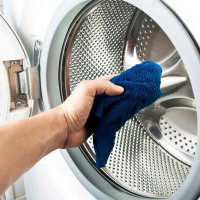 How and how to clean the washing machine: the best ways + an overview of special tools
How and how to clean the washing machine: the best ways + an overview of special tools 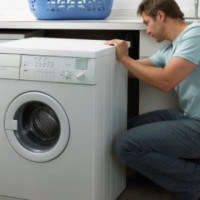 How to independently connect a washing machine: step-by-step installation instructions
How to independently connect a washing machine: step-by-step installation instructions  How to disassemble a washing machine: the nuances of disassembling models of different brands
How to disassemble a washing machine: the nuances of disassembling models of different brands 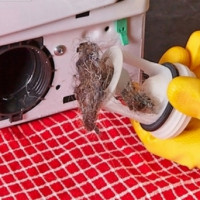 How to clean a filter in a washing machine: an overview of best practices
How to clean a filter in a washing machine: an overview of best practices 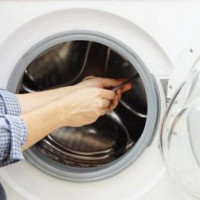 How to open a washing machine if it is locked: repair guide
How to open a washing machine if it is locked: repair guide 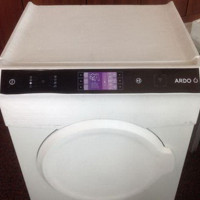 Ardo washing machines: a review of the lineup + advantages and disadvantages of brand washing machines
Ardo washing machines: a review of the lineup + advantages and disadvantages of brand washing machines 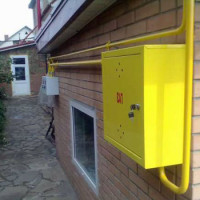 How much does it cost to connect gas to a private house: the price of organizing gas supply
How much does it cost to connect gas to a private house: the price of organizing gas supply  The best washing machines with dryer: model rating and customer tips
The best washing machines with dryer: model rating and customer tips  What is the color temperature of light and the nuances of choosing the temperature of the lamps to suit your needs
What is the color temperature of light and the nuances of choosing the temperature of the lamps to suit your needs 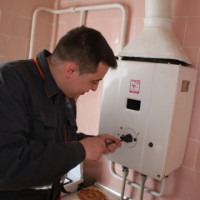 Replacement of a geyser in an apartment: replacement paperwork + basic norms and requirements
Replacement of a geyser in an apartment: replacement paperwork + basic norms and requirements
The washing machine has been serving us for about six years. At that time, it was quite expensive and of high quality. Now the prices for equipment are just huge. I learned a lot of new information, but still I do not believe that ordinary citric acid will help with such a problem as scale, especially since it has been collected there for years. I'll try your way soon. By the way, mom uses this method and speaks quite well about the lemon.
Well, for articles they began, I was just looking for “how to clean the washing machine with citric acid”, but there’s a mess of the preface, that’s why, and the little paragraph “how to clean with citric acid” ... which was all that was needed ...
Well do not read, who forces that? That's what kind of rams they’re about to go now; And for whom is the content done? Better let the expanded article be than uninformative. Uffff there is simply not enough evil for those who are near you.
For me, all these expensive descaling powders are not an indicator. I clean the machine only with citric acid. The washing machine has been working for me for a long time, I wash it often. I even clean the electric kettle with citric acid. By the way, no specific smell described above appears here, rubber parts do not burst, because citric acid does not corrode them. This is already on the verge of fantasy, how much it needs to be filled up so that it corrodes something.
For several years now, I have also been using citric acid to clean and descale a washing machine. I usually do it once a quarter. I just pour citric acid into the powder compartment and turn it on 90 degrees. No problems have been discovered so far. But now I thought about it, probably you still need to be more careful with a lemon, or you never know what, and the equipment is now expensive.
We have very hard water, so every six months I put the washer 90 degrees and fall asleep a couple packs of citric acid. She certainly eats away everything. But I could not cope with an unpleasant odor. There is no smell in the drum, just when I take out the laundry after washing, it smells unpleasant, like stale, musty, very strong. And I don’t even know what to do. Who can advise something how to deal with it? I tried to pour additional rinse aid, but the problem did not go away.
Hello. After each wash, clean the cuffs of the machine, drum, door. The drain filter and the detergent container must be cleaned at least once a week with frequent washing, and the machine itself - once every 3 months.
Use the powder dosages recommended by the manufacturer on the packaging and of course, choose products containing water softening ingredients. Wash at temperatures from 60 degrees. If nothing helps at all, install filters, for example, polyphosphate ones.
I periodically clean the LC, everything is fine, there was an unpleasant smell from the washed laundry, the detergent changed and the problem was gone.